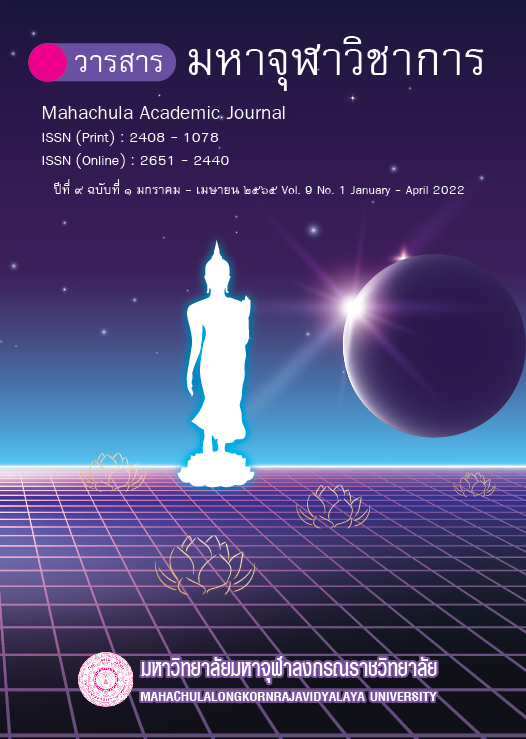Volunteer development model for enhancing moral values and ethical characteristics of the student council of Omnoisophonchanoopathum School
Main Article Content
Abstract
of the Student Council of Omnoisophonchanoopathum School consist of 12 components and 69 variables.
Volunteer development model for enhancing moral values and characteristics Ethics of the Student Council of Omnoisophonchanoopathum School has 4 main components; (1) Learning integrates into volunteer (2) Participation in volunteer activities (3) Morality and Ethics volunteer and (4) Social volunteering. This result indicates that the model is consistent with the empirical data.
Article Details

This work is licensed under a Creative Commons Attribution-NonCommercial-NoDerivatives 4.0 International License.
References
กระทรวงศึกษาธิการ. แผนปฏิบัติการส่งเสริมคุณธรรม ปะจำปีงบประมาณ พ.ศ. ๒๕๖๑. กรุงเทพมหานคร : ศูนย์ปฏิบัติการต่อต้านการทุจริต, ๒๕๕๑.
จเร พัฒนผล. “กลยุทธ์การพัฒนาจิตสาธารณะของนักเรียนสาหรับโรงเรียนประถมศึกษาในจังหวัดจันทบุรี”. ดุษฎีนิพนธ์ปริญญาปรัชญาดุษฎีบัณฑิต. บัณฑิตวิทยาลัย : มหาวิทยาลัยบูรพา, ๒๕๖๑.
ณัฏฐ์ชุดา สุภาพจน์. “จิตอาสาของนักศึกษามหาวิทยาลัยราชภัฏในเขตกรุงเทพมหานคร”. วารสารบัณฑิตวิทยาลัย. มหาวิทยาลัยราชภัฏจันทรเกษม. ปีที่ ๑๓ ฉบับที่ ๑ (มกราคม-มิถุนายน ๒๕๖๑): ๗๘-๘๘.
ธารากรณ์ กล้ากาสิการ. จิตสาธารณะหายจากสังคมปัจจุบัน. กรุงเทพมหานคร : เดลินิวส์, ๒๕๕๓.
ภัทรภร สีทองดี. “การพัฒนารูปแบบการสร้างเสริมจิตสาธารณะของนิสิตในสถาบันอุดมศึกษาของรัฐ: กรณีศึกษามหาวิทยาลัยศรีนครินทรวิโรฒ”. ดุษฎีนิพนธ์ปรัชญาดุษฎีบัณฑิต สาขาการบริหารการศึกษา. บัณฑิตวิทยาลัย : มหาวิทยาลัยบูรพา, ๒๕๕๙.
ศิริ แคนสา. “การพัฒนาจิตสำนึกสาธารณะนักเรียนชั้นมัธยมศึกษา: กรณีศึกษาโรงเรียนดอนสวรรค์”. ดุษฎีนิพนธ์การศึกษาดุษฎีบัณฑิต. บัณฑิตวิทยาลัย : มหาวิทยาลัยมหาสารคาม, ๒๕๕๑.
สภาวิจัยแห่งชาติ. ผลงานรางวัลระบบการวิจัยและพัฒนาพฤติกรรมประจำปีของประเทศไทย พ.ศ.๒๕๔๘. กรุงเทพมหานคร : สภาวิจัยแห่งชาติ, ๒๕๔๘.
สายฤดี วรกิจโภคาทร. การศึกษาคุณลักษณะและกระบวนการปลูกฝังคุณธรรมจริยธรรมในประเทศไทย. กรุงเทพมหานคร : ศูนย์ส่งเสริมและพัฒนาพลังแผ่นดินเชิงคุณธรรม (ศูนย์คุณธรรม), ๒๕๕๒.
สำนักงานเลขาธิการสภาการศึกษา. การวิจัยและพัฒนารูปแบบกลไกการเสริมสร้างวินัยนักเรียนในสถานศึกษา ระดับการศึกษาขั้นพื้นฐาน ด้านการมีจิตอาสา เสียสละ เห็นอกเห็นใจผู้อื่น. กรุงเทพมหานคร : บริษัท พริกหวานกราฟฟิค จำกัด, ๒๕๖๒.
อนุพันธ์ คำปัน. “ศึกษาองค์ประกอบจิตสาธารณะของนิสิตนักศึกษาในสถาบันอุดมศึกษาในเขตกรุงเทพมหานคร”. ดุษฎีนิพนธ์ครุศาสตรดุษฎีบัณฑิต. บัณฑิตวิทยาลัย : มหาวิทยาลัยศรีนครินทรวิโรฒ, ๒๕๕๘.
Ralph Teran. A case Study of Strategic Planning in a Large Urban School District (Urban Education). Dissertation Abstracts International, 2011, p. 10.
Shinichi, S. Publicness and taken-for-granted knowledge: A case study of communal land formation in rural Thailand. Institute of Developing Economies, JETRO, (vol.108), 2007.


